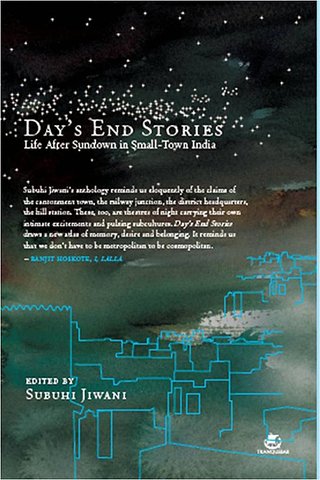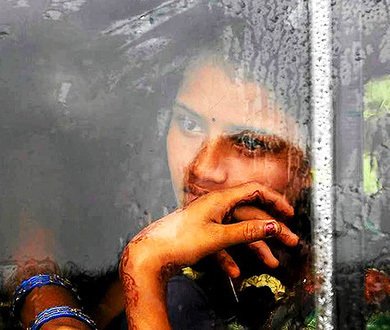
Why the literary world is falling in love with India’s lesser known cities and spaces
RAFIA ZAKARIA
[dropcap]I[/dropcap]t is the cities of India that have captured the world’s literary attentions: In Khushwant Singh’s novel, the betel nut-chewing Bhagmati tells us of Delhi; and the grandiose Saleem, of Rushdie’s Midnight’s Children, tells us of Bombay. It is this myth of urban life as the central motif of the Indian story that is dislodged a bit in a new anthology edited by Subuhi Jiwani.
The collection of essays in Days End Stories: Life After Sundown in Small Town India plumbs India’s lesser known spaces during their most dimly lit hours. In walks, literal and metaphorical, through the darkness of towns like Patna and Bikaner, Ahmedabad and Siliguri and McLeod Ganj and Pondicherry and several others, the small volume presents another India, one usually obscured by literary invisibility.
The volume begins with Amitava Kumar’s post-dusk jaunt through Bettiah and Patna, small towns in the province of Bihar, where the regularity of nightly power cuts has locals so used to routines of darkness that light seems to be an intrusion. Like many of the authors featured in the volume, Kumar is returning to the towns, and the exteriority of his perspective and its intrusion into its settled ways parallels how locals feel when darkness is interrupted by light. When the headlights of the car in which Kumar travels lights up one such abode he feels immediately guilty.
“I felt I was a party to a crime,” he says. “We were exposing to the people of Bettiah to the unprotected dimensions of their cramped lives.”
For the writer, however, the rituals of small town life, the magnification of characters in the absence of variety, is a treasure; and in the essay, Amitava Kumar shows how much his novel Home Objects drew from his experiences there. When Pawan, the protagonist of Home Objects, is asked which candidate he will vote for in an upcoming election, he answers, “in the dark all of them look the same.”
There is political commentary here, in the season of Indian elections, in which city dwellers stand convinced of the critical nature of their choices; the regularity of small town life, a life at the fringes, suggests greater circumspection, fewer expectations of radical changes.
It is not because small towns in India have not changed. In her essay on Aligarh, Little Women: Fewer Men, Taran Khan tells of young Muslim girls like herself growing up entirely in private spaces, where dusk bought the admonition of staying away, even from trees, in whose branches lurk spirits which could possess them.
In that Aligarh, the monotony of the everyday was broken only when the Numaish, a yearly exhibition and carnival, came to town and occasioned a nighttime trip. The single event where unrelated men and women were allowed to inhabit a public space, everything at the numaish seemed to be charged with romantic possibility — exchanged notes and glances, new romances, and rekindled old ones.
All of that is gone in the Aligarh of now, Khan laments, where cell phones make communication easy and requests to go the numaish elicit only eye-rolls from the teenagers of Aligarh’s today.
Light and dark, male and female, public and private, are not the only boundaries in India.
Traveling in and out of Juhapura, the Muslim ghetto within Ahmedabad, Zahir Janmohamed traverses another, bloodier division — that between India’s Hindus and Muslims.
The legacy of the 2002 riots lives on in the borders that define the larger city and the smaller Muslim city within it. Several Indian politicians, including Narendra Modi, have since been found complicit in the killings of hundreds of Muslims.
Over 12 years later, Janmohamed cannot take one rickshaw from his own apartment in Muslim Juhapura to a gathering outside its boundaries; when Hindu friends drop him off within, it is for them a jaunt into the unknown.
The wife says to the husband, “I don’t think we are in India anymore.”
“We are not,” the husband replies. Juhapura, in the heart of India, is called mini-Pakistan. Even in the smallest of Indian locales, the divisions of geography and nationalism are played out on a micro scale.
India, however, does not only belong to Indians; and India as a destination for seekers from all over the world emerges in Dharini Bhaskar’s A Country of Words, in the tiny town of McLeod Ganj in Himachal’s Kangra Valley.
It is the desolation of exiled Tibetans that dominates the tenor here, but it is not the only one. Around a bonfire one night, the author encounters an Israeli traveler seeking to escape the legacy of the Holocaust, which claimed his grandfather, “I’m tired of carrying death,” he says.
A French girl says she has lost her story. But the most poignant of truths is told by the Tibetan, also seated by the fire, and condemned perhaps by the least sought of exiles. Stealing a glance across the horizon where Tibet lies in China, he says,
Sadly, now, Tibet isn’t there either. There is no Tibet in Tibet.
His words could be said about India as well. In the essays in At Day’s End, we see a panoply of writers struggling against banishments of a varied sort — of past time, of abandoned homes, of elusive escapes, of misunderstood identities.
Somewhere in the compendium of their reflections is India, constructed through the authors’ memories and regrets, desires and disappointments. Together they testify to the reality that, like the small town and the elusive doings of its after hours, a real India told by Indians may be harder to find and tougher to love.
Like its small towns — forgotten, ignored and unloved — this India may yet be a more truthful one, un-obscured by the weight of expectations imposed on the known, the urban, and the loved.–Courtesy Dawn
Rafia Zakaria is a columnist for DAWN and a PhD candidate in Political Philosophy whose work and views have widely appeared in international media. She is the author of Silence in Karachi, forthcoming from Beacon Press.




